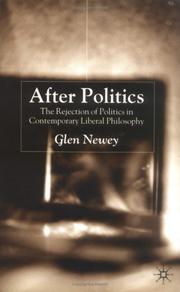| Listing 1 - 10 of 40 | << page >> |
Sort by
|

ISBN: 0333778138 Year: 2001 Publisher: Basingstoke Palgrave
Abstract | Keywords | Export | Availability | Bookmark
 Loading...
Loading...Choose an application
- Reference Manager
- EndNote
- RefWorks (Direct export to RefWorks)
Liberalism --- Liberal egalitarianism --- Liberty --- Political science --- Social sciences --- Liberalism.

ISBN: 0198201397 9780198201397 Year: 2001 Publisher: Oxford Clarendon
Abstract | Keywords | Export | Availability | Bookmark
 Loading...
Loading...Choose an application
- Reference Manager
- EndNote
- RefWorks (Direct export to RefWorks)
Liberalism --- Political science --- Liberal egalitarianism --- Liberty --- Social sciences --- History

ISBN: 0313001375 9780313001376 027596874X 9780275968748 Year: 2001 Publisher: Westport, Conn. : Praeger,
Abstract | Keywords | Export | Availability | Bookmark
 Loading...
Loading...Choose an application
- Reference Manager
- EndNote
- RefWorks (Direct export to RefWorks)
This work examines the political life of Italy's most notable prime minister after Cavour. Alongside Georges Clemenceau and David Lloyd George, Giovanni Giolitti (1842-1928) stands out as one of the major liberal reformers of late 19th- and early 20th-century Europe.
Liberalism --- Liberal egalitarianism --- Liberty --- Political science --- Social sciences --- History --- Giolitti, Giovanni, --- Italy --- Politics and government
Book
ISBN: 9681208927 6076288582 Year: 2001 Publisher: El Colegio de México
Abstract | Keywords | Export | Availability | Bookmark
 Loading...
Loading...Choose an application
- Reference Manager
- EndNote
- RefWorks (Direct export to RefWorks)
Tradicionalmente, la historiografía ha retratado al Segundo Imperio como un accidente que a México le vino de fuera. El periodo durante el cual gobernó al Archiduque rubio y barbado ha sido interpretado como ajeno, como un paréntesis en el desarrollo histórico nacional, producto exclusivamente de las ambiciones del emperador de los franceses y del Habsburgo segundón. El Imperio se pinta como una aventura espuria en la que a excepción de unos cuantos conservadores despechados, los mexicanos tuvieron muy poco que ver: antes bien el país entero olvidó sus antiguas disensiones para seguir las banderas de Patria y República que empuñaba Benito Juárez. Sin embargo, esta página romántica de la Historia Patria cuadra mal con la realidad de un régimen que si bien es cierto fue impuesto por las bayonetas francesa, también fue deseado, organizado y administrado por mexicanos. ¿Quiénes fueron estos? ¿Por qué colaboraron con el usurpador, adhiriéndose a un proyecto político que a posteriori parece absurdo? Al intentar dar respuesta a estas preguntas, esta obra intenta revalorar el episodio imperial como parte integral de la historia mexicana.
History of Mexico --- anno 1800-1899 --- Liberalism --- History --- Mexico --- Liberal egalitarianism --- Liberty --- Political science --- Social sciences --- History of the Americas

ISBN: 2130520510 9782130520511 Year: 2001 Volume: 351 Publisher: Paris PUF
Abstract | Keywords | Export | Availability | Bookmark
 Loading...
Loading...Choose an application
- Reference Manager
- EndNote
- RefWorks (Direct export to RefWorks)
Justice --- Liberalism --- Political stability --- Libéralisme --- Stabilité politique --- 32.01 --- -32.01 --- 929 RAWLS, JOHN --- Liberal egalitarianism --- Liberty --- Political science --- Social sciences --- Politicologie --- Philosophy --- 32.01 Politicologie --- -Philosophy

ISBN: 0199241740 9780199241743 Year: 2001 Publisher: Oxford Oxford university press
Abstract | Keywords | Export | Availability | Bookmark
 Loading...
Loading...Choose an application
- Reference Manager
- EndNote
- RefWorks (Direct export to RefWorks)
Distributive justice. --- Distribution (Economic theory) --- Equality. --- Responsibility. --- Distributive justice --- Equality --- Responsibility --- Accountability --- Moral responsibility --- Obligation --- Ethics --- Supererogation --- Egalitarianism --- Inequality --- Social equality --- Social inequality --- Political science --- Sociology --- Democracy --- Liberty --- Justice --- Social justice --- Wealth --- Moral and ethical aspects --- Distribution (Economic theory).
Book
ISBN: 0191037311 Year: 2001 Publisher: Oxford : Oxford University Press,
Abstract | Keywords | Export | Availability | Bookmark
 Loading...
Loading...Choose an application
- Reference Manager
- EndNote
- RefWorks (Direct export to RefWorks)
The author examines challenges to liberal thought posed by the changing circumstances of the modern world and considers whether liberal principles of justice can accommodate social and global interdependencies while reaffirming the importance of individual responsibility.
Liberalism --- Justice --- Responsibility --- Globalization --- Human Rights --- Law, Politics & Government --- Global cities --- Globalisation --- Internationalization --- International relations --- Anti-globalization movement --- Accountability --- Moral responsibility --- Obligation --- Ethics --- Supererogation --- Injustice --- Conduct of life --- Law --- Common good --- Fairness --- Liberal egalitarianism --- Liberty --- Political science --- Social sciences
Book
ISBN: 2841861511 9782841861514 Year: 2001 Publisher: Paris : Michalon,
Abstract | Keywords | Export | Availability | Bookmark
 Loading...
Loading...Choose an application
- Reference Manager
- EndNote
- RefWorks (Direct export to RefWorks)
Social justice --- Communitarianism --- Liberalism --- Pluralism --- Equality --- Justice --- Monadology --- Monism --- Philosophy --- Reality --- Liberal egalitarianism --- Liberty --- Political science --- Social sciences --- Social structure --- Walzer, Michael. --- Volzer, Maĭkl --- וולצר, מיכאל --- マイケル・ウォルツァー --- Ṿaltser, Mikhaʼel --- Ṿaltser, Maikel --- Walzer, Michael Laban

ISBN: 2251441891 9782251441894 Year: 2001 Publisher: Paris Belles Lettres
Abstract | Keywords | Export | Availability | Bookmark
 Loading...
Loading...Choose an application
- Reference Manager
- EndNote
- RefWorks (Direct export to RefWorks)
Sous ce titre polémique, l'auteur tente d'analyser, à la loupe d'un réalisme féroce, les idéalismes et les utopies qui fondent les motivations d'une frange engagée de l'intelligentsia française. Reprenant le discours néo-libéral, il rappelle notamment que le marché est une formidable machine à faire baisser les prix, donc à enrichir les pauvres et les classes moyennes tout autant que les riches.
Free enterprise --- Liberalism --- -Liberalism --- -383 Liberalisme --- 460.1 Markteconomie, Kapitalisme --- Neoliberalisme --- Globalisering --- Liberal egalitarianism --- Liberty --- Political science --- Social sciences --- Free markets --- Laissez-faire --- Markets, Free --- Private enterprise --- Economic policy --- 383 Liberalisme --- Free enterprise - France --- Liberalism - France

ISBN: 0691089035 0691117209 9786612087073 128208707X 1400824826 9781400824823 9780691117201 9780691089034 9780691117201 Year: 2001 Publisher: Princeton, N.J. Princeton University Press
Abstract | Keywords | Export | Availability | Bookmark
 Loading...
Loading...Choose an application
- Reference Manager
- EndNote
- RefWorks (Direct export to RefWorks)
Much political thinking today, particularly that influenced by liberalism, assumes a clear distinction between the public and the private, and holds that the correct understanding of this should weigh heavily in our attitude to human goods. It is, for instance, widely held that the state may address human action in the ''public'' realm but not in the ''private.'' In Public Goods, Private Goods Raymond Geuss exposes the profound flaws of such thinking and calls for a more nuanced approach. Drawing on a series of colorful examples from the ancient world, he illustrates some of the many ways in which actions can in fact be understood as public or private. The first chapter discusses Diogenes the Cynic, who flouted conventions about what should be public and what should be private by, among other things, masturbating in the Athenian marketplace. Next comes an analysis of Julius Caesar's decision to defy the Senate by crossing the Rubicon with his army; in doing so, Caesar asserted his dignity as a private person while acting in a public capacity. The third chapter considers St. Augustine's retreat from public life to contemplate his own, private spiritual condition. In the fourth, Geuss goes on to examine recent liberal views, questioning, in particular, common assumptions about the importance of public dialogue and the purportedly unlimited possibilities humans have for reaching consensus. He suggests that the liberal concern to maintain and protect, even at a very high cost, an inviolable ''private sphere'' for each individual is confused. Geuss concludes that a view of politics and morality derived from Hobbes and Nietzsche is a more realistic and enlightening way than modern liberalism to think about human goods. Ultimately, he cautions, a simplistic understanding of privacy leads to simplistic ideas about what the state is and is not justified in doing.
Liberalism --- Moral conditions --- Political ethics --- Ethics, Political --- Ethics in government --- Government ethics --- Political science --- Politics, Practical --- Ethics --- Civics --- Morals --- Social history --- Social norms --- Liberal egalitarianism --- Liberty --- Social sciences --- Moral and ethical aspects --- Liberalism. --- Political ethics. --- Moral conditions.
| Listing 1 - 10 of 40 | << page >> |
Sort by
|

 Search
Search Feedback
Feedback About
About Help
Help News
News